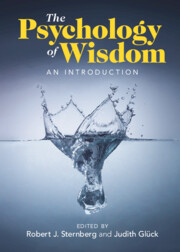Book contents
- The Psychology of Wisdom
- The Psychology of Wisdom
- Copyright page
- Contents
- Figures
- Tables
- Contributors
- Preface
- Part I Introduction to Wisdom Theory and Research
- Chapter 1 Introduction
- Chapter 2 Philosophical Foundations for the Study of Wisdom
- Chapter 3 Folk Conceptions of Wisdom around the World
- Chapter 4 Psychological Theories of Wisdom
- Chapter 5 Wisdom
- Chapter 6 Measurement of Wisdom
- Part II Foundations of Wisdom in the Individual and in the World
- Part III The Modifiability of Wisdom
- Part IV Wisdom in the World
- Index
- References
Chapter 1 - Introduction
What Is Wisdom and Why Is It Important?1
from Part I - Introduction to Wisdom Theory and Research
Published online by Cambridge University Press: 26 May 2022
- The Psychology of Wisdom
- The Psychology of Wisdom
- Copyright page
- Contents
- Figures
- Tables
- Contributors
- Preface
- Part I Introduction to Wisdom Theory and Research
- Chapter 1 Introduction
- Chapter 2 Philosophical Foundations for the Study of Wisdom
- Chapter 3 Folk Conceptions of Wisdom around the World
- Chapter 4 Psychological Theories of Wisdom
- Chapter 5 Wisdom
- Chapter 6 Measurement of Wisdom
- Part II Foundations of Wisdom in the Individual and in the World
- Part III The Modifiability of Wisdom
- Part IV Wisdom in the World
- Index
- References
Summary
This chapter discusses why wisdom is so important. It opens with a discussion of why wisdom is so crucial in today’s world. The chapter points out that the world faces enormous problems, such as global climate change and threats of, and actual pandemics. Wisdom is needed more than ever, but often is not to be found. The chapter then discuss why intelligence, at least as usually defined, is not enough. Many people are smart, but they use their smarts only for their own benefit, or for the benefit of people like themselves rather than for a common good. The chapter next discusses why creativity is not enough. People can be creative but use their creativity for selfish or even destructive ends. Finally, the chapter discusses why wisdom is so hard to find. Many people appear, on the surface, to be wise, but then prove not to be. The chapter ends with some brief conclusions.
- Type
- Chapter
- Information
- The Psychology of WisdomAn Introduction, pp. 3 - 14Publisher: Cambridge University PressPrint publication year: 2022



